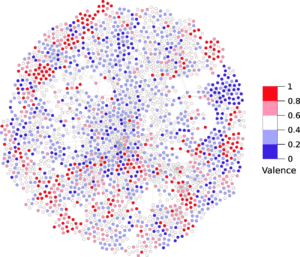Anna Di Natale, Max Pellert, David Garcia

Colexification is a linguistic phenomenon that occurs when multiple concepts are expressed in a language with the same word. Colexification patterns are frequently used to estimate the meaning similarity between words, but the hypothesis that these are related is still missing direct empirical validation at scale. Here, we show for the first time that words linked by colexification patterns capture similar affective meanings. Using pre-existing translation data, we extend colexification databases to cover much longer word lists. We achieve this with an unsupervised method of affective lexicon extension that uses colexification network data to interpolate the affective ratings of words that are not included in the original lexicon. We find positive correlations between network-based estimates and empirical affective ratings, which suggest that colexification networks contain information related to affective meanings. Finally, we compare our network method with state-of-the-art machine learning, trained on a large corpus, and show that our simple linguistics-informed unsupervised algorithm yields comparable performance with high explainability. These results show that it is possible to automatically expand affective norms lexica to cover exhaustive word lists when additional data are available, such as in colexification networks.